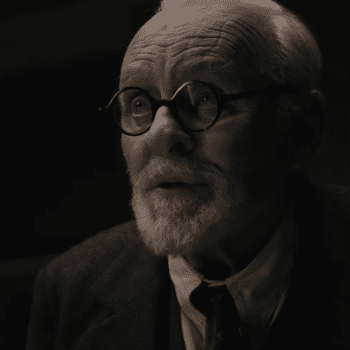It’s 2011, and the faith healing service is in full swing. The auditorium is full of people singing—sick and hurting, desperate for help.
“It’s the end of my pain as I know it,” they sing gently, turning an old R.E.M. song into a hopeful hymn. “It’s the end of my pain as I know it.”
In the midst of the crowd, Steve Gleason—a former NFL player recently diagnosed with ALS, or Lou Gehrig’s disease—turns to his wife, Michel.
“Should I run?” He asks.
This isn’t Steve’s religious environment anymore, and his wife is deeply skeptical. He was brought to the service by his father, Mike—strict, deeply religious, desperate to help his son. Steve’s desperate, too. Even though he’s gravitated away from the faith of his father, he wants to give the healing a chance to work. He wants to be healed. He wants to live. You can almost hear the hope in his voice. The desire to believe.
“Should I run?” He asks again. Even though he’s just in the early stages of ALS, he’s already struggling to walk. He shuffles now—far from his days as a football player, when his college teammates called him an “kamikaze,” when his all-out effort earned this undrafted free agent an eight-year NFL career. Without divine intervention, Steve knows, his walking days are numbered. ALS cuts off the circuitry from brain to body a cord at a time. It’ll rob him of his ability to walk, to speak, eventually to even breathe. Most ALS patients die within five years.
Steve needs a miracle.
He slowly makes his way up to the front of the auditorium and gets ready to run. He takes one step, two, three. Then his legs seem to crumple. He’s too far forward. He collapses, his shoulder and head hitting the carpet. Michel and Mike help gather him up.
Gleason’s a movie of hard moments, but this scene is among the most painful. You, like Steve, are rooting for the miracle.
Gleason—opening today in Seattle and rolling wider in the weeks to come—is one of the toughest, most powerful movies I’ve seen this year. The documentary shows us about four years of Steve’s life in uncomfortable honesty. But it’s also an inspirational movie—a movie about fatherhood and faith, and finding the courage to get back up … even when you need your family and friends to lift you.
When a new treatment actually speeds up Steve’s disease and he loses control of his bowels, the camera lingers by the door. We see the toll the disease takes on he and Michel’s marriage: We feel for both of them, both trying to do the right thing but trapped in their own ways by ALS’s prison.
But it also shows us how Steve becomes an inspirational figure. How he uses his celebrity to give folks stricken with the disease a little help (his charity was instrumental in ensuring that speech devices like he uses to be funded through Medicare) and a little hope (through once-in-a-lifetime trips).
Throughout the film, we see Steve record a video diary of his life for his son, Rivers—a boy whom he and Michel found out was on his way just six weeks after his diagnosis. “I want to pass on as much of myself as I can to you,” he tells the camera.

It’s through these video diaries that we see Steve’s steady decline. His speech grows more slurred. His movements more stilted. He cries sometimes. He rages sometimes. And Steve—a guy who has a cross tattooed between his shoulder blades, wonders what he could’ve done to deserve this slow, incessantly regressive life.
“God, if you have some control over this universe, why is this happening to me?”
There is no answer, of course, as much as both he and his father may look for one. Throughout the film, we see the two of them return again and again to the theme of faith—a faith that they both hold dear but which manifests itself in starkly different ways.
“We don’t know God’s mind,” Steve tells his protesting father at one point. “If I’m sick and I die, it’s because I didn’t have the mind of Christ?”
Later, Steve rails against his dad. “Every time you question my faith, it crushes me,” he says. He insists that his faith is fine. “My soul is saved!” he yells. And in that moment, Mike wraps Steve in his arms, his own grief and fear pouring out as they both hold each other and cry.
Gleason is a hard movie to watch in several ways. It contains plenty of profanity. We’re privy to uncomfortable moments. And it’s painful—deeply painful—to watch Steve’s slide. But just because a movie’s hard to watch doesn’t make it unwatchable. This is a worthy film. A film I’m glad to have seen, and one I’ll be thinking about for a long time to come.
“People will say ‘it’s such a sad, tragic story,'” Steve tells us, “And it is sad. But it’s not all sad.” And he’s right.













